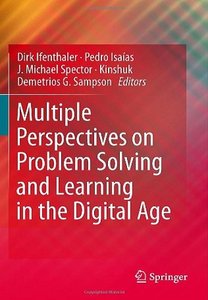Multiple Perspectives on Problem Solving and Learning in the Digital Age |

|
 Diese Seite wurde seit 15 Jahren inhaltlich nicht mehr aktualisiert.
Unter Umständen ist sie nicht mehr aktuell.
Diese Seite wurde seit 15 Jahren inhaltlich nicht mehr aktualisiert.
Unter Umständen ist sie nicht mehr aktuell.
 Zusammenfassungen
Zusammenfassungen
 This edited volume with selected expanded papers from CELDA (Cognition and Exploratory Learning in the Digital Age) 2009 (http://www.celda-conf.org/) addresses the main issues concerned with problem solving, evolving learning processes, innovative pedagogies, and technology-based educational applications in the digital age. There have been advances in both cognitive psychology and computing that have affected the educational arena. The convergence of these two disciplines is increasing at a fast pace and affecting academia and professional practice in many ways. Paradigms such as just-in-time learning, constructivism, student-centered learning and collaborative approaches have emerged and are being supported by technological advancements such as simulations, virtual reality and multi-agents systems. These developments have created both opportunities and areas of serious concerns. This volume aims to cover both technological as well as pedagogical issues related to these developments.
This edited volume with selected expanded papers from CELDA (Cognition and Exploratory Learning in the Digital Age) 2009 (http://www.celda-conf.org/) addresses the main issues concerned with problem solving, evolving learning processes, innovative pedagogies, and technology-based educational applications in the digital age. There have been advances in both cognitive psychology and computing that have affected the educational arena. The convergence of these two disciplines is increasing at a fast pace and affecting academia and professional practice in many ways. Paradigms such as just-in-time learning, constructivism, student-centered learning and collaborative approaches have emerged and are being supported by technological advancements such as simulations, virtual reality and multi-agents systems. These developments have created both opportunities and areas of serious concerns. This volume aims to cover both technological as well as pedagogical issues related to these developments. Dieses Buch erwähnt ...
Dieses Buch erwähnt ...
 Begriffe KB IB clear | Konstruktivismusconstructivism
,  Konvergenz Konvergenz convergence
, convergence
,  Lernen Lernen learning
, Paradigmaparadigm
, learning
, Paradigmaparadigm
,  Virtual Reality Virtual Reality virtual reality
, virtual reality
,  WWW (World Wide Web) WWW (World Wide Web) World Wide Web World Wide Web
|
 Dieses Buch erwähnt vermutlich nicht ...
Dieses Buch erwähnt vermutlich nicht ... 
 Nicht erwähnte Begriffe | Virtualität |
 Volltext dieses Dokuments
Volltext dieses Dokuments
 | Multiple Perspectives on Problem Solving and Learning in the Digital Age: Gesamtes Buch als Volltext ( : :  , 7075 kByte) , 7075 kByte) |
 Bibliographisches
Bibliographisches 
| Titel | Format | Bez. | Aufl. | Jahr | ISBN | ||||||
| Multiple Perspectives on Problem Solving and Learning in the Digital Age | D | - | - | 1 | 2010 | 1441976116 |  |
 |
 |
 Beat und dieses Buch
Beat und dieses Buch
Beat hat dieses Buch während seiner Zeit am Institut für Medien und Schule (IMS) ins Biblionetz aufgenommen. Beat besitzt kein physisches, aber ein digitales Exemplar. (das er aber aus Urheberrechtsgründen nicht einfach weitergeben darf). Aufgrund der wenigen Einträge im Biblionetz scheint er es nicht wirklich gelesen zu haben. Es gibt bisher auch nur wenige Objekte im Biblionetz, die dieses Werk zitieren.










 Biblionetz-History
Biblionetz-History